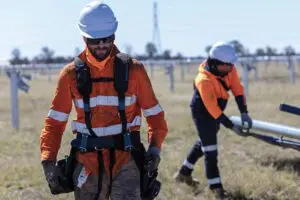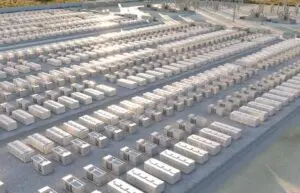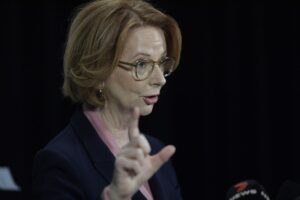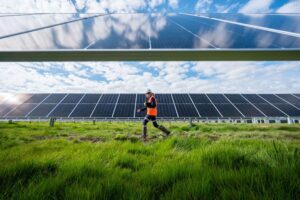Three years ago, when the federal Coalition government flew in the face of climate science and horrified the renewables industry with Scott Morrison’s plan for a “gas-led recovery” for post-Covid Australia, the then shadow minister for environment denounced the policy as a fraud.
“It’s a slogan, it’s not a policy. It’s simply a fraud,” Chris Bowen said. As federal energy minister in December 2022, Bowen doubled down on this view.
Fast forward to May 2024 and federal Labor has come up with something that is, arguably, worse.
The Future Gas Strategy, unveiled on Thursday by federal resources minister Madeleine King, reads like a 110-page love letter to the gas industry, seeking to lock in the climate wrecking fossil fuel as a “crucial” energy generation and export staple through “to 2050 and beyond.”
According to the strategy, not only will Australia continue to burn all of the methane gas currently available to it, but it will continue to seek out new reserves and exploit them, something the International Energy Agency called for an end to back in 2021. It will not support state and territory government moves to ban fossil gas from homes.
“It is clear we will need continued exploration, investment and development in the sector to support the path to net zero for Australia and for our export partners,” says King.
“Under all credible net zero scenarios, natural gas is needed through to 2050 and beyond, though its production and use will change over this period.”
King says her department has used “evidence and data” to establish six principles to underpin future government policies and actions and to ensure that “discussion of gas and gas policy moves beyond unthoughtful slogans.”
“We cannot rely on past investments in gas to get us through the next decades. We need continued investment in, and development of, gas supply and transport infrastructure to get us through the energy transition with thriving industries,” she said.
“To secure the clean, affordable and reliable energy Australia needs to compete in the global race for jobs and opportunities, and we need to capitalise on our natural resource endowment.”
And while the distinct message is that we must desperately scrape together all available gas resources for future supply, there is no plan to phase it out of homes, but instead a promise that “households will continue to have a choice over how their energy needs are met.”
How can we do all of this and still meet our national emissions and renewable energy targets and Paris climate commitments? Abatement and offsets, says King – even though there is no firm evidence anywhere in the world that carbon capture and storage techniques can or will work at that scale into the future.
Unsurprisingly, the Greens are not impressed and, using the same language as Chris Bowen in 2021, have slammed the policy as a fraud.
“Labor are climate frauds, backing coal and gas past 2050 while scientists ring alarm bells and the planet boils. Labor has just lost all climate credibility,” said Greens leader Adam Bandt on Thursday.
“Why should the Greens work with Labor on legislation apparently aimed at cutting pollution, like the fuel efficiency bill, if Labor is then going to reverse any climate gains by fast-tracking new coal and gas projects?”
The Australian Conservation Foundation says the Future Gas Strategy is a kick in the guts to the millions of Australians who voted for the Albanese government based on its support for renewables and climate action.
“To replace one fossil fuel with another is not a clean energy transition,” said ACF national climate program manager Gavin McFadzean.
“The strategy’s blind faith in the effectiveness of carbon capture and storage – a technology with the sole purpose of extending the life of fossil fuel industries – is deeply concerning.
“It peddles a number of falsehoods, including the myth that there is a domestic gas shortage.”
IEEFA, too, disputes the government’s claims that future gas supply will be tight. Its analysts say cost-effective measures to lower residential gas demand will eliminate the risk of annual and peak day shortfalls in the southern states while also lowering household energy bills.
Meanwhile, it says global demand is forecast to fall.
“Our research has found that further gas exploration and development is definitely not needed,” saus IEEFA’s lead gas financial analyst Josh Runciman.
“A massive wave of new LNG supply will come online from 2025 and create a glut in the second half of this decade. Much of this new LNG supply is still looking for end buyers. This new supply is more than sufficient to meet global LNG demand under all IEA scenarios.
“We do not agree that demand for Australian LNG will remain strong until 2035. We expect Australia’s LNG contract volumes in 2035 will be less than half of what they are in 2024. Demand from Japan – Australia’s largest LNG buyer – has been falling since 2014, and will continue to fall as Japan relies less on LNG and restarts more nuclear power plants.”
Tim Buckley, director of Climate Energy Finance, says the only winners from the Future Gas Strategy will be the multinational fossil fuel giants.
“And the only gas shortage is a shortage of gas cartel ethics, aided and abetted by a government that appears to be suffering a severe case of industry capture,” he adds.
“The failure of our governments over the last decade to properly regulate the multinational gas cartel gouging Australians is a leading cause of the climate, energy and cost of living crises impacting Australians today,” Buckley said on Thursday.
“The strategy released today is a massive misstep in the context of the strides the Albanese government has been making in pivoting to our economic future as renewables powered zero-emissions trade and investment leader.”S
Shiva Gounden, head of Pacific at Greenpeace Australia Pacific, says the strategy is “a dagger in the back” for Australia’s Pacific region neighbours.
“While Minister King courts Japanese investment, Minister Bowen will need to meet Pacific Island communities face-to-face at future COP meetings: will he stand by and allow this to happen?”
“This strategy is a capitulation to the gas lobby at the expense of manufacturers, workers and households struggling with the cost of living, who will all pay more for energy because of it,” says Carmel Flint, national coordinator with Lock the Gate.
“The gas industry has mercilessly price-gouged Australians, with gas prices more than tripling in the last 10 years, driving up energy prices more broadly and destroying manufacturing.
“Treasurer Jim Chalmer’s plan for a Future Made in Australia will be a Fossil Fuel Disaster Made in Australia if this strategy is allowed to proceed.
“It is solar, not gas, that is key to a renewables transition in Australia, and doubling down on gas will impede that transition severely and undoubtedly blow our climate targets.
“We’re calling on the Prime Minister, the Treasurer, and Climate Change Minister Chris Bowen to repudiate this failed Morrison-era plan” Flint said.
Environment Victoria CEO Jono La Nauze said the announcement came on the same day that climate scientists say the world is struggling to keep average global heating under 1.5 degrees.
“Pretending gas is a climate solution is a throwback to the Scott Morrison era and is straight out of the gas lobby playbook,” he said.
The gas industry declared itself pleased, and so too did the Energy Users Association of Australia, whose CEO Andrew Richards has previously complained of a government “jihad” against the fossil fuel.
“We need a comprehensive plan to ensure we can extract more gas for domestic purposes from a broader group of producers, so we can improve competition and deliver lower cost energy for Australian households and business,” he said.










